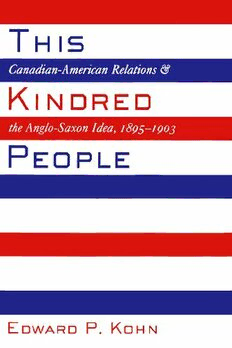
This Kindred People: Canadian-American Relations and the Anglo-Saxon Idea, 1895-1903 PDF
Preview This Kindred People: Canadian-American Relations and the Anglo-Saxon Idea, 1895-1903
This Kindred People This page intentionally left blank This Kindred People Canadian-American Relations and the Anglo-Saxon Idea, 1895-1903 EDWARD P. KOHN McGill-Queen's University Press Montreal & Kingston • London • Ithaca © McGill-Queen's University Press 2004 ISBN 0-7735-2796-6 Legal deposit fourth quarter 2004 Bibliotheque nationale du Quebec Printed in Canada on acid-free paper that is 100% ancient forest free (100% post-consumer recycled), processed chlorine free. This book has been published with the help of a grant from the Canadian Federation for the Humanities and Social Sciences, through the Aid to Scholarly Publications Programme, using funds provided by the Social Sciences and Humanities Research Council of Canada. McGill-Queen's University Press acknowledges the support of the Canada Council for the Arts for our publishing program. We also acknowledge the financial support of the Government of Canada through the Book Publishing Industry Development Program (BPIDP) for our publishing. National Library of Canada Cataloguing in Publication Kohn, Edward P. (Edward Parliament), 1968- This kindred people: Canadian-American relations and the Anglo-Saxon idea, i895-i9O3/Edward P. Kohn. Includes bibliographical references and index. ISBN 0-7735-2796-6 I. Canada - Relations - United States. 2. United States - Relations - Canada. 3. Anglo-Saxon race. 4. Canada - Foreign relations- 1867-1918. 5. United States - Foreign relations - 1865-1921. i. Title: FC249.K63 2004 327.7io73'o9'o34 C2004-902684-4 Typeset in Sabon 10/12 by Caractera inc., Quebec City Contents Introduction: The Anglo-Saxon Mirror 3 I The Venezuela Crisis, Canada, and American "Hemispherism": The North American Context of the Rapprochement and the Anglo-Saxon Response I3 2 John Charlton and the Limits of Anglo-Saxonism: The Failure of Reciprocity and the Anglo-American Joint High Commission 52 3 "White Man's Burden": English-Canadian Anglo-Saxonism and the Spanish-American War 92 4 The Crest and Decline of North American Anglo-Saxonism: The South African War, the Alaska Modus Vivendi, and the Abrogation of the Clayton-Bulwer Treaty 135 5 The Defeat (and Triumph) of North American Anglo-Saxonism: The Alaska Boundary Tribunal I67 Conclusion: The Obsolescence of North American Anglo-Saxonism I96 Notes 207 Bibliography 229 Index 247 This page intentionally left blank This Kindred People This page intentionally left blank Introduction: The Anglo-Saxon Mirror The Anglo-Saxon leads the van. And never lags behind, .For was he not ordain'd to be The leader of mankind? Alexander McLachlan, "The Anglo-Saxon" At the end of the nineteenth century, English-speaking North Ameri- cans discussed race as later generations might discuss the weather. The same subjects found a ready audience on both sides of the border. In the press, in speeches, and in their letters to one another, Canadians and Americans discussed the common issues of immigration, "Indians," Jews, blacks, and French Canadians. In his The Winning of the West, Theodore Roosevelt made no effort to conceal his contempt for the "savages," who were destined to be "displaced" on the continent.1 The editor of Queen's Quarterly welcomed Americans to the Canadian west because "they will help to give an Anglo-Saxon character to the social, economic and political development of the west."2 France's "Dreyfus Affair" incited anti-Semitism in much of North America. A frequent resident of Paris, Henry Adams wrote to his good friend John Hay about "Wall Street Jews," and to his brother Brooks wrote simply, "I loathe the Jew."3 Writing from Toronto to a friend in I898 Goldwin Smith urged sympathy for Spain because "she burned a good number of Jews."4 Men in each country also discussed the unique racial makeup of their neighbour. Theodore Roosevelt expressed alarm to Francis Parkman about the number of French Canadians "swarming into New England with ominous rapidity" and speculated that "their race will in many places supplant the old American stock."5 For their part, Cana- dians often argued against union with the United States because of America's racial conflict. "There is no conflict of races in Canada," J. Schurman wrote in I889, arguing against political union with the republic. "For that, in its most hopeless aspect too," he noted, "you
